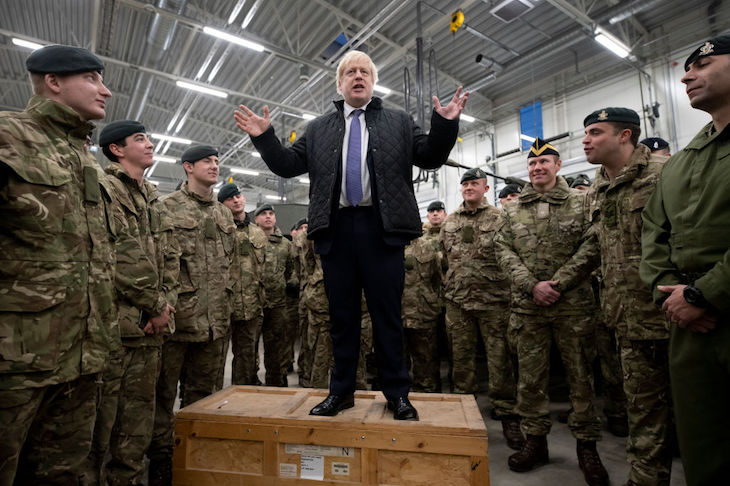Much of the post-election attention has gone on the next stage of Brexit and the government’s attempts to set down a domestic reform agenda that works for the Tories’ new northern constituencies. As such, the Integrated Security, Defence and Foreign Policy Review, briefed as ‘the deepest review of Britain’s security, defence, and foreign policy since the end of the Cold War’, has so far been somewhat overlooked. Yet, as the terms of both the Queen’s Speech and Downing Street’s briefing underscore, this review will ‘reassess the nation’s place in the world’, a pretty significant remit. The Sovereign committed her ministers to ‘promot[ing] the United Kingdom’s interests… work[ing] closely with international partners to help solve the most complex international security issues and promote peace and security globally… [and] stand[ing] firm against those who threaten the values of the United Kingdom’.
Successive governments have treaded cautiously on foreign policy since Iraq, which reflects elite and popular scepticism about the UK’s role in shaping the international order but also led to moral abdications like Parliament’s decision to let Bashar al-Assad crack on with it in 2013. If Britain is re-entering the international stage, it is long overdue but ministers can’t simply return to the old terms we left on. Although September’s spending round continued the shift away from defence austerity, the MoD still hasn’t recovered from the George Osborne years. To be a serious player once again, we need to reach the defence footprint of a serious player. We may be one of only seven Nato members to meet the two per cent GDP target but if we want to raise our ambitions we will have to consider raising that threshold. Donald Trump’s suggestion of four per cent, though seemingly plucked at random, at least nods in the right direction.
Reasserting world power status isn’t just about how many guns and soldiers the UK has but about what it decides are its interests and values and how it goes about projecting them. Brexit will mean establishing trade links in regions Britain has neglected for decades and where, for reasons of history, we may not be universally welcomed. This will involve diplomatic, commercial and logistical efforts but it will also mean having a clear brand, something more than goods offered and services sought — a national story of who we are, where we are going and the impact we want to have on the world.
That gets us into questions of our values and their practical realisation. Where do we stand on refugees? How far are we prepared to go to slow climate change? Do we continue to ignore China’s mass-scale human rights abuses so we can do business with Beijing? If Boris Johnson is the disruptor that some hope and others dread, we might expect a break from old Foreign Office orthodoxies and priorities. There isn’t much evidence for this so far but plenty of potential for a foreign policy that advances Britain’s interests and ethos without apology or deference to the practised cynicism of King Charles Street. A foreign policy honest to Britain’s values would, for example, withdraw from the sham Iran deal which has not stifled Tehran’s pursuit of nuclear weapons. Christians living under global persecution, raised by Jeremy Hunt but back off the agenda after his departure, is a cause in sore need of a champion. That the Prime Minister mentioned them in his Christmas message is a good sign.
Whether Boris is to be a disruptor on foreign policy probably depends on whether Dominic Cummings’ interests extend there. But there is plenty to disrupt and, if the Trump administration has nothing else going for it, it has shown that breaking with establishment thinking on foreign affairs seldom brings the catastrophic consequences breathlessly assured by practitioners and academic apologists of the status quo. America’s pivot on Israel under the current president is a case study in how political disruptors can clear hurdles erected by devoutly held but ultimately specious received wisdom. Every time Trump has veered off the preferred route of the Council on Foreign Relations or the editorial board of the New York Times, a ten-car pile-up has been predicted. Whether it was on recognising Jerusalem as Israel’s capital, moving the US embassy there, confirming Israeli sovereignty over the Golan Heights or decreeing that settlements are not inconsistent with international law. Far from collision, relations between and among the US, Israel and the Arab world have never been better. Sticking to your values not only shows strength — it works.
There is scope for Boris to do something similar and, if he is so minded, Israel would seem an obvious and relatively low-risk sandbox to try out a disruptor foreign policy. Longstanding Foreign Office froideur towards Israel means we are far away from matching Washington’s reliable ally status but we could begin to move in that direction in a number of ways, such as changing our language (drop prejudicial terminology like ‘occupied Palestinian territories’), changing our voting patterns at the UN, changing our position on Jerusalem (recognise it as what it is, Israel’s capital, and transfer our embassy there), and changing our expectations of the Palestinians (condition continuing aid on an end to the Palestinian Authority Martyrs Fund, which pays stipends to the families of Palestinians killed or apprehended while carrying out terrorist attacks on Israelis). We’ve done it the Foreign Office’s way long enough; time to try something different.
Whatever Boris’s instincts on Israel — his anti-boycotts law is encouraging but he is still a patrician liberal Tory and therefore to be regarded with suspicion on Israel — the Integrated Security, Defence and Foreign Policy Review represents a landmark opportunity. Not only can the UK rebuild its defence capability, but it can also break with a calcified dogma that prevents it from rewarding its allies and asserting its values in such a way as to attract fresh allies. This will be invaluable not only for trade but as a diplomatic counterbalance to the emerging supranational military power across the English Channel. Britain will have her Brexit but striding out into the world is a serious endeavour and she will have to get serious about it.







Comments